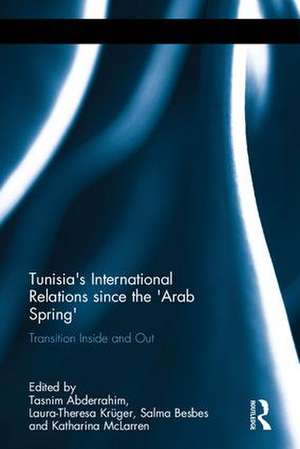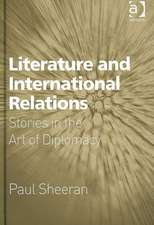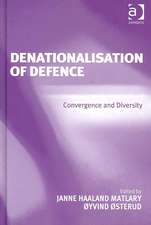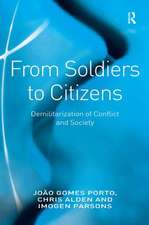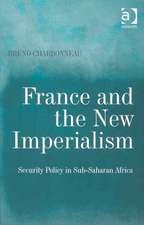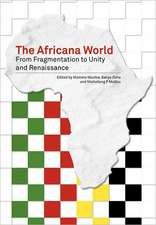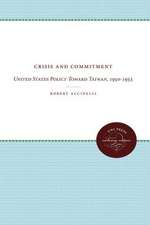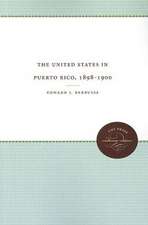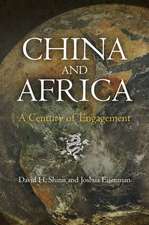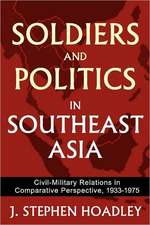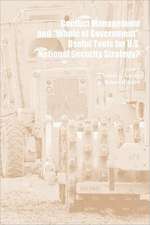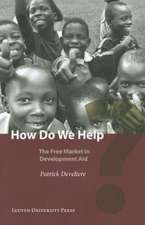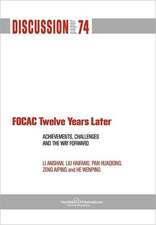Tunisia's International Relations since the 'Arab Spring': Transition Inside and Out: Routledge Studies in Middle Eastern Democratization and Government
Editat de Tasnim Abderrahim, Laura-Theresa Krüger, Salma Besbes, Katharina McLarrenen Limba Engleză Hardback – 20 sep 2017
This book assesses Tunisia’s transition ‘inside and out’ from four angles: Tunisian polity and politics which provide the framework for its foreign policy since the ‘Arab Spring’; bilateral relations before and after the ‘Arab Spring’; Tunisia’s activism in international organisations as well as their presence in Tunisia; and transnational issues in Tunisia. Drawing on a broad range of primary sources, including authors’ own interview material conducted with politicians and representatives of civil society and international NGOs involved in the transition process, the book shows that since 2011 Tunisia has not only developed fundamentally at the domestic level, but also at the level of external relations. New and old alliances, a broadening of relations, and new activism of civil society and of Tunisia in international organisations certify that Tunisia has the potential to play an increasingly important role regionally as well as internationally.
Providing an encompassing picture of Tunisia’s changed role and successful transition from an autocracy to a democracy, the book allows students and scholars in the field to understand the ‘last country standing’ better, a country that both the scientific community and the political scene should not underestimate for the promises it holds.
| Toate formatele și edițiile | Preț | Express |
|---|---|---|
| Paperback (1) | 389.66 lei 6-8 săpt. | |
| Taylor & Francis – 12 dec 2019 | 389.66 lei 6-8 săpt. | |
| Hardback (1) | 1000.27 lei 6-8 săpt. | |
| Taylor & Francis – 20 sep 2017 | 1000.27 lei 6-8 săpt. |
Din seria Routledge Studies in Middle Eastern Democratization and Government
-
 Preț: 326.49 lei
Preț: 326.49 lei -
 Preț: 311.41 lei
Preț: 311.41 lei -
 Preț: 282.83 lei
Preț: 282.83 lei -
 Preț: 324.87 lei
Preț: 324.87 lei - 19%
 Preț: 256.49 lei
Preț: 256.49 lei -
 Preț: 449.41 lei
Preț: 449.41 lei - 17%
 Preț: 272.50 lei
Preț: 272.50 lei - 9%
 Preț: 935.17 lei
Preț: 935.17 lei -
 Preț: 389.66 lei
Preț: 389.66 lei -
 Preț: 386.30 lei
Preț: 386.30 lei - 18%
 Preț: 1002.99 lei
Preț: 1002.99 lei -
 Preț: 389.38 lei
Preț: 389.38 lei - 13%
 Preț: 338.33 lei
Preț: 338.33 lei - 18%
 Preț: 998.71 lei
Preț: 998.71 lei - 18%
 Preț: 1060.25 lei
Preț: 1060.25 lei -
 Preț: 395.63 lei
Preț: 395.63 lei -
 Preț: 469.34 lei
Preț: 469.34 lei - 17%
 Preț: 255.05 lei
Preț: 255.05 lei - 18%
 Preț: 893.90 lei
Preț: 893.90 lei -
 Preț: 409.69 lei
Preț: 409.69 lei - 18%
 Preț: 1053.16 lei
Preț: 1053.16 lei -
 Preț: 469.34 lei
Preț: 469.34 lei -
 Preț: 449.41 lei
Preț: 449.41 lei - 19%
 Preț: 259.98 lei
Preț: 259.98 lei -
 Preț: 455.78 lei
Preț: 455.78 lei - 18%
 Preț: 1053.95 lei
Preț: 1053.95 lei - 18%
 Preț: 1000.51 lei
Preț: 1000.51 lei -
 Preț: 391.61 lei
Preț: 391.61 lei -
 Preț: 381.21 lei
Preț: 381.21 lei - 18%
 Preț: 272.23 lei
Preț: 272.23 lei -
 Preț: 319.29 lei
Preț: 319.29 lei - 18%
 Preț: 1002.02 lei
Preț: 1002.02 lei
Preț: 1000.27 lei
Preț vechi: 1219.84 lei
-18% Nou
Puncte Express: 1500
Preț estimativ în valută:
191.40€ • 199.84$ • 158.41£
191.40€ • 199.84$ • 158.41£
Carte tipărită la comandă
Livrare economică 04-18 aprilie
Preluare comenzi: 021 569.72.76
Specificații
ISBN-13: 9781138738201
ISBN-10: 1138738204
Pagini: 370
Ilustrații: 18
Dimensiuni: 156 x 234 x 29 mm
Greutate: 0.45 kg
Ediția:1
Editura: Taylor & Francis
Colecția Routledge
Seria Routledge Studies in Middle Eastern Democratization and Government
Locul publicării:Oxford, United Kingdom
ISBN-10: 1138738204
Pagini: 370
Ilustrații: 18
Dimensiuni: 156 x 234 x 29 mm
Greutate: 0.45 kg
Ediția:1
Editura: Taylor & Francis
Colecția Routledge
Seria Routledge Studies in Middle Eastern Democratization and Government
Locul publicării:Oxford, United Kingdom
Public țintă
Postgraduate and UndergraduateCuprins
Introduction, Tasnim Abderrahim, Salma Besbes, Laura-Theresa Krüger, Katharina McLarren & Bernhard Stahl PART I Principles, aspirations, limitations: reshaping Tunisia’s foreign policy 1. The polity of Tunisia’s external relations before and after 2011, Ines Kalai & Jaweher Skhiri 2. The Essebsi government (2011): continuity or change? Aymen Briki & Reinhardt Rummel 3. The Troika governments (2011-2014): orientations and constraints Mohamed Nidhal Zaier & Ignaz Völk 4. The Jomaa government (2014-2015): Tunisia as a ‘Start-up Democracy’ Tasnim Abderrahim & Mootaz Ghothbani PART II Oscillation, cooperation, commitment: Tunisia and its partners 5. France and Tunisia: friendship reactivated? Laura-Theresa Krüger 6. Germany and Tunisia: friendship in the making? Edmund Ratka & Bernhard Stahl 7. Tunisia and the EU: ‘more of the same’ or starting anew? Laura-Theresa Krüger, Edmund Ratka & Emna Chihi Ouji 8. Turkey and Tunisia: building bridges in stormy times? Elena Dück & Rihab Kordi 9. The U.S. and Tunisia: from democracy promotion to security consolidation Salma Besbes & Tasnim Abderrahim PART III Inspiration, conditionality, concertation: Tunisia and international institutions 10. International Financial Institutions: business as usual in Tunisia? Lisa Spantig 11. The Arab Maghreb Union: a new quality of foreign policy cooperation? Laura-Theresa Krüger & Mohamed Nidhal Zaier 12. Arab League and United Nations: Tunisia’s new activism? Katharina McLarren PART IV Challenges, uncertainty, determination: key transnational issues 13. Tunisia’s migration policy: from a reactive to a proactive approach Sabrine Souissi & Katharina McLarren 14. Tunisia’s security policy: threats and reform efforts Soumaya Hichri & Ignaz Völk 15. Radicalisation and terrorism in Tunisia: the lure of jihadism for a marginalised youth Edmund Ratka & Marie-Christine Roux What is ‘new’ regarding Tunisia’s place in the world: empirical findings and theoretical departures Bernhard Stahl Index
Descriere
This book assesses Tunisia’s transition ‘inside and out’ from four angles: Tunisian polity and politics which provide the framework for its foreign policy since the Arab Spring; bilateral relations before and after the Arab Spring; Tunisia’s activism in international organisations as well as their presence in Tunisia; and transnational issues.
Notă biografică
Tasnim Abderrahim holds an M.A. in English Studies from the University of Tunis and was one of the coordinators of the German-Tunisian research project Tunisia in Transition. Her research interests include foreign policy analysis and democratization.
Laura-Theresa Krüger is a PhD candidate in International Relations at the University of Passau, Germany. Previously one of the coordinators of the research project Tunisia in Transition, her research interests include development policy, French and European foreign policies.
Salma Besbes is a PhD candidate in International Relations at the University Tunis Carthage and offers courses on Human Rights at the University of Kairouan. In 2015 and 2016, she was one of the coordinators of the research project Tunisia in Transition.
Katharina McLarren is a PhD candidate who focuses on religion in IR theories. She works for the Chair of International Politics at the University of Passau, Germany and was one of the coordinators of the research project Tunisia in Transition
Laura-Theresa Krüger is a PhD candidate in International Relations at the University of Passau, Germany. Previously one of the coordinators of the research project Tunisia in Transition, her research interests include development policy, French and European foreign policies.
Salma Besbes is a PhD candidate in International Relations at the University Tunis Carthage and offers courses on Human Rights at the University of Kairouan. In 2015 and 2016, she was one of the coordinators of the research project Tunisia in Transition.
Katharina McLarren is a PhD candidate who focuses on religion in IR theories. She works for the Chair of International Politics at the University of Passau, Germany and was one of the coordinators of the research project Tunisia in Transition
